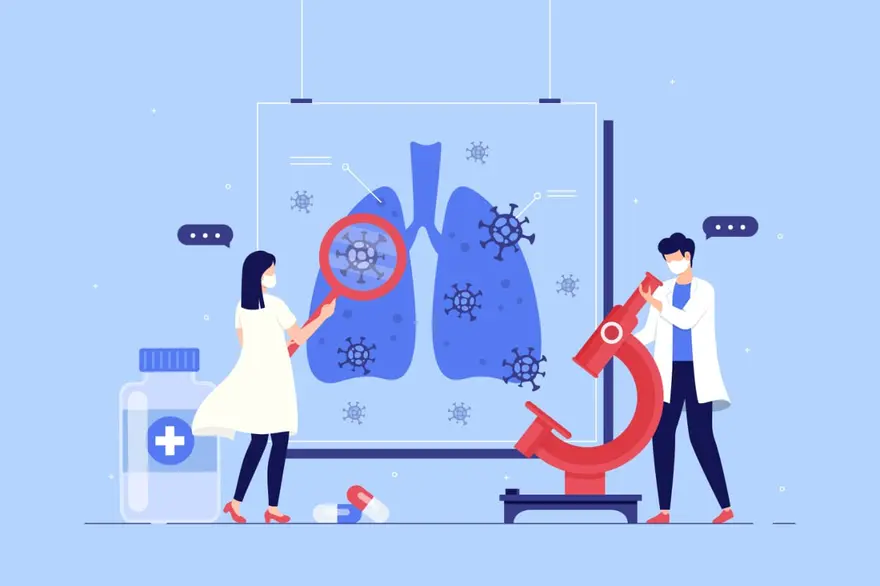Preventive Healthcare
Empyema: Understanding Pus in the Pleural Space and Treatment Options
233 Views
0

What is empyema?
Empyema refers to the accumulation of pus in the pleural cavity, which is the thin fluid-filled space between the lungs and the chest wall. The pleura are two thin membranes that line the chest cavity and cover the lungs. Normally, a small amount of fluid is present in the pleural space, allowing the lungs to move smoothly during breathing. Empyema causes infection pus to build up in this space, putting pressure on the lungs.
Is empyema a COPD?
No, empyema is not a chronic obstructive pulmonary disease (COPD). COPD is a group of long-term lung conditions, such as emphysema and chronic bronchitis, that cause airflow blockage and breathing problems. In contrast, empyema is an acute condition characterised by infected fluid collecting in the pleural space due to an underlying infection.
Who does empyema affect?
Empyema can affect people of all ages, but it is more common in certain groups:
- Children, especially those under 5
- Older adults over 65
- People with weakened immune systems
- Individuals with underlying lung diseases like pneumonia or tuberculosis
- Those who have recently undergone chest surgery or experienced a chest injury
How common is empyema?
Empyema is relatively uncommon, affecting about 1 in 100,000 people annually. However, it is a serious complication of pneumonia, occurring in about 5% of pneumonia cases.
What are the symptoms of empyema?
Empyema symptoms may appear a few days to several weeks after contracting pneumonia or another infection. Empyema symptoms can include:
- Fever and chills
- Chest pain that worsens with breathing or coughing
- Shortness of breath
- Cough, often producing foul-smelling, greenish phlegm
- Unintentional weight loss
- Fatigue and weakness
What causes empyema?
The most common among empyema causes is bacterial pneumonia. When pneumonia is left untreated or doesn't respond to antibiotics, the infection can spread from the lungs into the pleural space. This leads to a collection of pus, which can become very thick over time.
Other empyema causes include:
- Complications from lung surgery
- Ruptured lung abscesses
- Chest injuries or trauma
- Infections from IV drug use
- Fungal infections in immunocompromised individuals
How quickly does empyema develop?
Empyema usually develops over a few days to weeks. It progresses in three stages - The exudative stage, the fibrinopurulent stage, and the organising stage.
Is empyema contagious?
Empyema itself is not contagious. However, the underlying infections that cause empyema, such as bacterial pneumonia or tuberculosis, can spread from person to person.
How is empyema diagnosed?
If your doctor suspects empyema based on your symptoms and physical exam, they may recommend the following tests for a thorough empyema diagnosis:
- Chest X-ray: Can show fluid accumulation in the pleural space
- CT scan: Provides more detailed images of the lungs and pleura
- Ultrasound: Helps guide needle placement for thoracentesis
- Thoracentesis: A procedure where a needle is inserted into the pleural space to remove fluid for testing
What tests will be done to diagnose empyema?
For an empyema diagnosis, your doctor may recommend several tests to confirm infection and assess the severity.
- A complete blood count (CBC) can reveal elevated white blood cells, signaling infection.
- Blood cultures may also be performed to detect bacteria in the bloodstream.
- To identify the specific causative organism, pleural fluid will be extracted for culture and Gram stain analysis.
- Additional pleural fluid tests for pH and glucose levels, which are usually low in empyema, offer further diagnostic clarity.
- Imaging studies, such as chest X-rays, CT scans, or ultrasounds, help visualise fluid collections in the pleural cavity and assess their extent.
Can empyema be cured?
Yes, empyema can be cured with prompt and appropriate treatment. The goals of treatment are to drain the infected fluid, eliminate the underlying infection, and allow the lung to re-expand. Most people make a full recovery, but the prognosis depends on factors like age, overall health, and the severity of the empyema. Delayed treatment can lead to complications like sepsis, lung abscesses, or pleural thickening that may require surgery.
What medications treat empyema?
Treatment for empyema typically involves antibiotics to clear the infection. Broad-spectrum antibiotics are started initially and then tailored to target the specific bacteria found in the pleural fluid.
How soon after treatment will I feel better?
Many people start to feel better within a few days of starting empyema treatment. Chest pain and shortness of breath often improve once the infected fluid is drained. Fatigue and cough may linger for a few weeks. Most people are able to return to their normal activities after 2-4 weeks, but complete recovery can take several months.
How can I prevent empyema?
Some steps you can take to lower your risk of developing empyema include:
- Stay up to date on pneumococcal and flu vaccines
- Treat respiratory infections promptly
- Don't smoke and avoid secondhand smoke
- Practice good oral hygiene
- Manage chronic conditions like diabetes
- Maintain a healthy lifestyle with adequate rest, nutrition, and exercise
What can we expect if we have empyema?
If you are diagnosed with empyema, you can expect:
- A hospital stay of 7-10 days or longer for IV antibiotics and chest tube drainage
- Daily monitoring of vital signs, fluid output, and lung function
- Repeat imaging to track progress
- Possible surgical intervention if the infection doesn't improve with antibiotics alone
- Several weeks of antibiotic therapy and reduced activity levels
- Regular follow-up visits to ensure complete resolution
What is the difference between pneumonia and empyema?
- Pneumonia is an infection of the lung tissue itself, while empyema is an infection of the pleural space surrounding the lungs.
- Pneumonia is much more common, affecting about 1% of the population, compared to 0.001% for empyema.
- Pneumonia causes productive cough, fever, and breathing difficulties. Empyema often develops as a complication when pneumonia spreads to the pleural cavity, leading to pus accumulation and more severe symptoms.
- Both conditions are treated with antibiotics, but empyema also requires drainage of the infected fluid.
What is the difference between empyema and an abscess?
- An abscess is a localised pocket of pus that develops within the lung tissue due to an infection. Empyema is a collection of pus in the pleural space surrounding the lungs.
- Abscesses are usually well-contained and may respond to antibiotics alone. Empyema is more diffuse and almost always requires drainage.
- Occasionally, a large abscess can rupture into the pleural space, causing empyema. Both conditions can occur as complications of pneumonia.
What is the difference between empyema and pleural effusion?
- A pleural effusion is a general term for excess fluid buildup in the pleural space. This fluid can be serous (clear), bloody, or purulent (pus-filled). Empyema specifically refers to infected fluid or pus in the pleural cavity, making it a type of pleural effusion.
- Other causes of pleural effusions include heart failure, kidney disease, liver cirrhosis, and cancer. Empyema is always caused by an infection and requires antibiotic treatment.
What is the difference between empyema and parapneumonic effusion?
- A parapneumonic effusion is a pleural effusion that develops secondary to pneumonia. It can be either uncomplicated (clear fluid) or complicated (pus-like fluid). Empyema is a complicated parapneumonic effusion where the fluid is frankly purulent.
- Parapneumonic effusions are very common, occurring in 20-40% of pneumonia cases, while empyema is much rarer.
Conclusion
Empyema is a serious condition that requires prompt medical attention. If you have symptoms of empyema, especially following a bout of pneumonia, don't delay seeking care.
At Metropolis Healthcare, we offer comprehensive diagnostic services to help identify the underlying cause of your symptoms. Our team of skilled phlebotomists can collect blood and pleural fluid samples in the comfort of your home. Take charge of your health today!













1701259759.webp)









 WhatsApp
WhatsApp